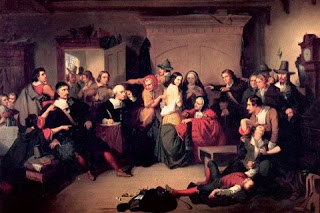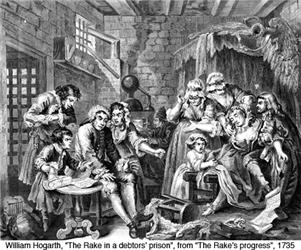Changing Life of People (Social/Economic)
Production of food and products alike increased into what some historians refer to as the Consumer Revolution. These new developments happened most in the urban settings of northwest Europe and colonial cities in North America. New notions about self expression and individuality developed, as both the elite and urban poor classes began to wear similar styles of dress with a greater variety of dyes manufactured by enslaved Africans. Merchants in the eighteenth century also developed expert marketing techniques which increased demand of consumers.
 |
Emile by Rosseau
"We are born weak, we need strength; helpless, we need aid; foolish, we need reason. All that we lack at birth, all that we need when we come to man's estate, is the gift of education."
-- Jean-Jacques Rosseau

1700
Common Meals
1700
The style of dining included a large pot where family members would use to dip their spoons in. As more cutlery and a greater variety of dishes were generated as the eighteenth century neared, families ate with more communal utensils.
1700
Modest family homes
In the 1700s, family homes were modest with a few rooms, each serving multiple functions. For example, the same room was utilized for working, sleeping, and greeting friends. Nearing the eighteenth century, rents skyrocketed and it was difficult to maintain a larger space. As a result, families set up partitions for individual privacy.
 |
| Women's fashions |
Growth in fashion and the wardrobe
Choice of clothing went from bland to diverse— garments were often characterized with flamboyant colors and diversity. Regardless of class, fashion became a priority to everyone. Higher class people were often taken aback at the nicely dressed lower classes. This tied into the Consumer Revolution, which preached individuality through personal presentation and self-identity.
Choice of clothing went from bland to diverse— garments were often characterized with flamboyant colors and diversity. Regardless of class, fashion became a priority to everyone. Higher class people were often taken aback at the nicely dressed lower classes. This tied into the Consumer Revolution, which preached individuality through personal presentation and self-identity.
Illegitimacy explosion
The main reason for an exploding number of illegitimate children was the increase of sexual activity among unmarried people. The numbers went from around 2% to eventually 25% babies being born out of wedlock as the eighteenth century neared.
The main reason for an exploding number of illegitimate children was the increase of sexual activity among unmarried people. The numbers went from around 2% to eventually 25% babies being born out of wedlock as the eighteenth century neared.
Call for children to be treated better
As a result of harsh child rearing, the Enlightenment movement encouraged the onset of tenderness towards younger ones. Various critics condemned parents who used corsets to mold waists of little children, and called for mothers to nurse babies themselves. One of the most influential works regarding child rearing was Emile by Rosseau.
As a result of harsh child rearing, the Enlightenment movement encouraged the onset of tenderness towards younger ones. Various critics condemned parents who used corsets to mold waists of little children, and called for mothers to nurse babies themselves. One of the most influential works regarding child rearing was Emile by Rosseau.
 |
| Foundling Homes |
1/3 of babies in foundling homes
As a result of having illegitimate offspring, mothers often sent their young ones into foundling homes— synonymous to orphanages. Approximately 1/3 of mothers sent their children there, although around 50% of them died within a year.
As a result of having illegitimate offspring, mothers often sent their young ones into foundling homes— synonymous to orphanages. Approximately 1/3 of mothers sent their children there, although around 50% of them died within a year.
 |
| Smallpox disease |
60 million Europeans die from smallpox disease
Around 80% of the population was directly affected from smallpox. Smallpox was essentially the greatest affecting disease after the bubonic plague.
Around 80% of the population was directly affected from smallpox. Smallpox was essentially the greatest affecting disease after the bubonic plague.
36% of babies born out of wedlock






.jpg)









































